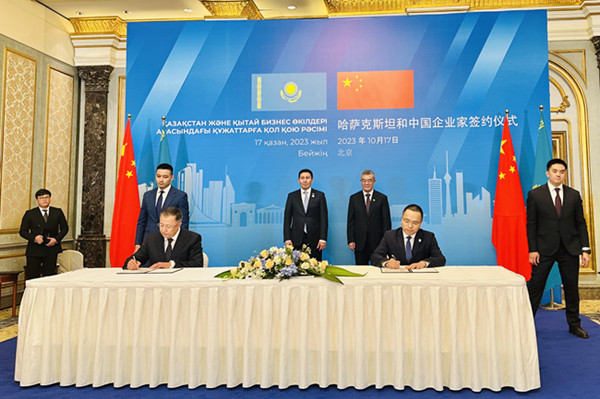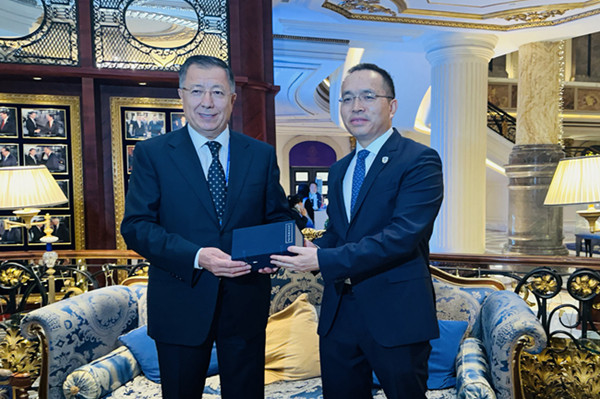- Research
- Research Centers
- Journals
- Admission
- Introduction
- Programs
- Application
- Alumni & Giving
- Alumni Club
- Giving
Beijing Foreign Studies University (BFSU) and Al-Farabi Kazakh National University (KazNU) have taken a significant step towards fostering educational cooperation and cultural exchanges by signing a supplemental agreement on student and staff exchanges.
The agreement was inked by Yang Dan, president of BFSU and deputy secretary of the CPC BFSU committee, and Tuimebayev Zhanseit Kanseituly, rector of KazNU, on Oct 17.

Yang Dan (front right), president of BFSU and deputy secretary of the CPC BFSU committee, and Tuimebayev Zhanseit Kanseituly (front left), rector of KazNU, sign a supplemental agreement on student and staff exchanges. [Photo/bfsu.edu.cn]
Yang thanked the support KazNU has offered to BFSU's Russian and Kazakh bilingual program. Undergraduate and postgraduate students under the joint training of the two universities have transitioned into their professional careers, contributing to the development of Kazakh language talents and strengthening Sino-Kazakh exchanges, Yang said.
Yang expressed his eagerness to expand cooperation beyond the realm of global languages into such areas as global culture and governance research to promote collaboration across industry, academia and research and nurture innovative outcomes, ultimately enhancing the Belt and Road Initiative (BRI).
Tuimebayev emphasized the significance of exchanges between the two countries and commended BFSU's active role in training talents in the Kazakh language and Kazakh studies. He concurred with Yang's cooperative proposals, expressing his willingness to work alongside BFSU to turn these ideas into reality and further advance collaborative achievements within the framework of the comprehensive Sino-Kazakh strategic partnership.

Yang Dan (R), president of BFSU and deputy secretary of the CPC BFSU committee, and Tuimebayev Zhanseit Kanseituly (L), rector of KazNU, pose for a photo. [Photo/bfsu.edu.cn]
The BRI was first proposed 10 years ago in Kazakhstan. To better serve this initiative, BFSU's School of Russian admitted its first cohort of undergraduate students to its Russian and Kazakh bilingual program in the autumn of 2016. Four years later in 2020, the second cohort was admitted, further solidifying the program's success.
In 2017, the university established the Centre for Kazakhstan Studies, a center for country and area studies registered with the Ministry of Education. This move enabled the university’s comprehensive endeavors in teaching the Kazakh language, crafting educational materials, and conducting in-depth research on Kazakhstan. Currently, BFSU is actively collaborating with KazNU in training PhD-level Kazakh language educators.